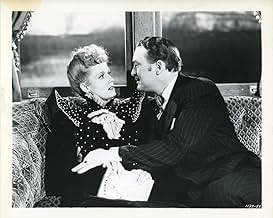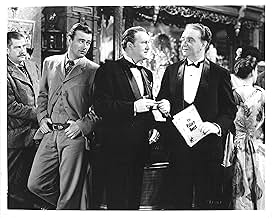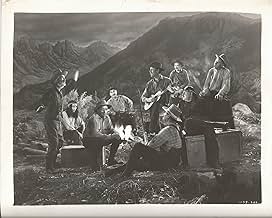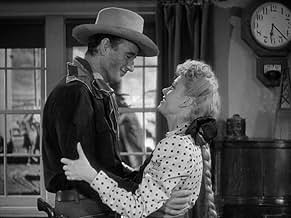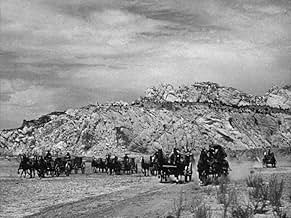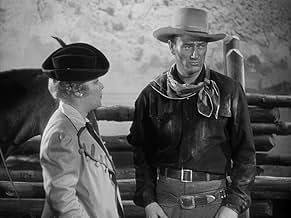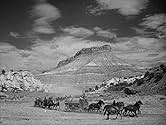NOTE IMDb
6,3/10
1,7 k
MA NOTE
Ajouter une intrigue dans votre langueIn 1906, on Oklahoma's Indian lands, a cowboy fights for oil lease rights against a greedy oilman while a pretty schoolteacher steals both men's hearts.In 1906, on Oklahoma's Indian lands, a cowboy fights for oil lease rights against a greedy oilman while a pretty schoolteacher steals both men's hearts.In 1906, on Oklahoma's Indian lands, a cowboy fights for oil lease rights against a greedy oilman while a pretty schoolteacher steals both men's hearts.
- Réalisation
- Scénario
- Casting principal
- Nommé pour 2 Oscars
- 2 nominations au total
Foncilla Adams
- Girl
- (non crédité)
Stanley Andrews
- Mason - Indian Agent
- (non crédité)
Charles Arnt
- Joe - Train Conductor
- (non crédité)
Avis à la une
One of Poverty Row studio Republic's intermittent big-budget efforts, War of the Wildcats is a lively, if fairly routine, western notable for its early 20th-century setting. Wayne plays Daniel F. Somers, formerly one of Teddy Roosevelt's rough riders, who finds himself entangled in a love-and-oil battle with Albert Dekker. Wayne is fairly amiable here, representing the old west and the little man forced to adapt in the face of modern technology and the dawn of big business. Dekker, of course, represents this future. He drives one of them new-fangled auto-mobeels and is erecting oil wells just as fast as he can. He is also dismissive of the native population he even has one, a Cherokee, scrub his back as he takes a bath while Wayne shows them respect and receives it in return. I'm not quite sure how that stacks up today, given our knowledge that the treatment of the native American by the old west fell somewhat short of what can be considered fair.
Anyway, possibly the best aspect of this film is that Dekker's character isn't portrayed as an out-and-out villain, driven only by greed. He is smart and relatively sophisticated, and also brave. Anyone who has ever had the experience of working with or for a 'captain of industry' (for want of a better term) or a self-made man, will probably recognise oilman Gardner's characteristics exactly as those that account for the success of these people. They aren't necessarily bad people, just ruthless enough to do whatever is necessary in pursuit of their goals.
Martha Scott is a fairly bland heroine it's difficult to see why such rugged individuals as Somers and Gardner would both be so keen to bed her. Gardner's frankness in this matter is also refreshing given the times in which this film was made. He makes no secret of what he desires from Catherine and doesn't resort to any particular underhand tactics to make his desires come true. Of course, he doesn't succeed it would be another quarter of a century before Hollywood would allow a character like Jim Gardiner to win the girl (and the oil).
Anyway, possibly the best aspect of this film is that Dekker's character isn't portrayed as an out-and-out villain, driven only by greed. He is smart and relatively sophisticated, and also brave. Anyone who has ever had the experience of working with or for a 'captain of industry' (for want of a better term) or a self-made man, will probably recognise oilman Gardner's characteristics exactly as those that account for the success of these people. They aren't necessarily bad people, just ruthless enough to do whatever is necessary in pursuit of their goals.
Martha Scott is a fairly bland heroine it's difficult to see why such rugged individuals as Somers and Gardner would both be so keen to bed her. Gardner's frankness in this matter is also refreshing given the times in which this film was made. He makes no secret of what he desires from Catherine and doesn't resort to any particular underhand tactics to make his desires come true. Of course, he doesn't succeed it would be another quarter of a century before Hollywood would allow a character like Jim Gardiner to win the girl (and the oil).
Spanish American War Veteran John Wayne hitches a ride on oil magnate Albert Dekker's private railroad car just as he's putting the moves on traveling school teacher Martha Scott. That sets off a rivalry between them both professional and personal as Wayne gets under Dekker's skin.
Dekker's the big kahuna in Oklahoma territory which would soon be admitted under President Theodore Roosevelt to the union. He's crowding a lot of the small operators out of the field and they see in Wayne a leader and savior.
Later on when Wayne and Dekker compete with the rival proposals for leasing Indian oil lands they go to the White House where Dekker thinks he's got an inside track with the Interior Department. This leads to one of the three best scenes in the film. It turns out that the Duke served in the Rough Riders. The reunion of Wayne and Sidney Blackmer as Theodore Roosevelt is pretty good, who'd have thought Wayne would have had the ultimate inside track.
Dale Evans is in the film, she has a brief role as a saloon entertainer and sings a couple of period songs. She had not yet met her future husband Roy Rogers on the Republic lot, but in fact she was more the westerner than he in real life. He was from a rural Ohio town and she was from Uvalde, Texas. Dale also sang with Anson Weeks band before coming west both literally and figuratively.
Martha Scott is a good crinolined heroine wooed by both Wayne and Dekker. You will also see Grant Withers in one of his few roles in which he wasn't a villain.
Second best scene in the film, John Wayne emptying his pistol into Paul Fix who played one of Dekker's henchmen who actually goes a bit too far because of his personal hatred for Wayne.
Third best scene, the climatic rush to deliver oil by covered wagons and tankers when Dekker buys the pipeline to fulfill the contract. The normally parsimonious Republic studio and its boss Herbert J. Yates broke the piggy bank to stage this one in what was obviously their big budget film of the year. Still plays quite well today.
This is one of John Wayne's better films of the forties. He's given good production values in this western and a perfect role for him. Fans of the eternal Duke should not miss this one.
Dekker's the big kahuna in Oklahoma territory which would soon be admitted under President Theodore Roosevelt to the union. He's crowding a lot of the small operators out of the field and they see in Wayne a leader and savior.
Later on when Wayne and Dekker compete with the rival proposals for leasing Indian oil lands they go to the White House where Dekker thinks he's got an inside track with the Interior Department. This leads to one of the three best scenes in the film. It turns out that the Duke served in the Rough Riders. The reunion of Wayne and Sidney Blackmer as Theodore Roosevelt is pretty good, who'd have thought Wayne would have had the ultimate inside track.
Dale Evans is in the film, she has a brief role as a saloon entertainer and sings a couple of period songs. She had not yet met her future husband Roy Rogers on the Republic lot, but in fact she was more the westerner than he in real life. He was from a rural Ohio town and she was from Uvalde, Texas. Dale also sang with Anson Weeks band before coming west both literally and figuratively.
Martha Scott is a good crinolined heroine wooed by both Wayne and Dekker. You will also see Grant Withers in one of his few roles in which he wasn't a villain.
Second best scene in the film, John Wayne emptying his pistol into Paul Fix who played one of Dekker's henchmen who actually goes a bit too far because of his personal hatred for Wayne.
Third best scene, the climatic rush to deliver oil by covered wagons and tankers when Dekker buys the pipeline to fulfill the contract. The normally parsimonious Republic studio and its boss Herbert J. Yates broke the piggy bank to stage this one in what was obviously their big budget film of the year. Still plays quite well today.
This is one of John Wayne's better films of the forties. He's given good production values in this western and a perfect role for him. Fans of the eternal Duke should not miss this one.
A lesser entry in the John Wayne canon, but not without interest. I thought Duke did quite well with the light comedy in the first part of the film before getting tough later on. And he looks as good as he ever did.
I liked the opening scene as the camera panned along the train interior catching the comments of the passengers - including, I'm sure, Guinn "Big Boy" Williams who had a few words to say, though the film doesn't appear in his filmography on this site or in Quinlan.
Albert Dekker is quite a likable villain, and, for the era in which the film was made, it's quite clear what his intentions are towards Martha Scott; the innuendo is strong, and in the hotel she even looks into the room adjoining hers and gasps when she spots the bed where he wants her to end up.
I'm a bit dubious about the total oil capacity of the various wagons at the end of the film and how easily some of the explosions occurred, but the sequence is quite a novel one. And the period - very early 20th century - is an interesting one, with the film making several allusions to the new life-style that will be made possible by oil.
Apparently Rhonda Fleming is in the chorus line in her very first film, and Gabby Hayes isn't too annoying in his customary old coot/sidekick role.
I liked the opening scene as the camera panned along the train interior catching the comments of the passengers - including, I'm sure, Guinn "Big Boy" Williams who had a few words to say, though the film doesn't appear in his filmography on this site or in Quinlan.
Albert Dekker is quite a likable villain, and, for the era in which the film was made, it's quite clear what his intentions are towards Martha Scott; the innuendo is strong, and in the hotel she even looks into the room adjoining hers and gasps when she spots the bed where he wants her to end up.
I'm a bit dubious about the total oil capacity of the various wagons at the end of the film and how easily some of the explosions occurred, but the sequence is quite a novel one. And the period - very early 20th century - is an interesting one, with the film making several allusions to the new life-style that will be made possible by oil.
Apparently Rhonda Fleming is in the chorus line in her very first film, and Gabby Hayes isn't too annoying in his customary old coot/sidekick role.
This a John Wayne film like no other. Take it from a huge fan that's seen most of his movies. Although this not classified as a comedy, the Duke's turns in a sly performance full of great one-liners and facial expressions that had me rolling. Its action adventure in the oil fields and it's very entertaining and fun. Wayne is Cowboy Dan Somers and he competes with oilman Jim Gardner for oil lease rights on Indian land in Oklahoma, as well as for the attentions of schoolteacher turned scandalous book author Cathy Allen. It has a good supporting cast including George "Gabby" Hayes. You will never see the Duke quite like this in any other role. If you're a fan of the Duke, you will love this film. It was originally titled "In Old Oklahoma" and then reissued as "War of the Wildcats".
This was Republic's most successful picture of 1943, offering solid if unspectacular entertainment.
It is a somewhat unusual western, being set in the early 20th century and featuring an antagonist (played by Albert Dekker) who is a ruthless businessman rather than the conventional evil villain. Dekker represents modernity and Wayne, of course, the more traditional hard moral man.
The two male leads compete for the heart of a romance writer played by Martha Scott, and for the oil rights of the Indian territory, with Wayne representing a much less predatory way of doing business.
Add some humor and lively action scenes and you get a quite enjoyable product, if a bit formulaic.
It is a somewhat unusual western, being set in the early 20th century and featuring an antagonist (played by Albert Dekker) who is a ruthless businessman rather than the conventional evil villain. Dekker represents modernity and Wayne, of course, the more traditional hard moral man.
The two male leads compete for the heart of a romance writer played by Martha Scott, and for the oil rights of the Indian territory, with Wayne representing a much less predatory way of doing business.
Add some humor and lively action scenes and you get a quite enjoyable product, if a bit formulaic.
Le saviez-vous
- AnecdotesSidney Blackmer made a career out of playing Teddy Roosevelt. He played him eight times in various film projects. 1-"This Is My Affair" (1937) 2-"The Monroe Doctrine" (1939) 3-"Teddy the Rough Rider" (1940) 4-"March On, America!" (1942) 5-"In Old Oklahoma" (1943), 6-"Bill "Buffalo Bill" (1944) 7-"My Girl Tisa" (1948) 8-"Never Kick a Man Upstairs" (TV Movie) (1953).
- Citations
Bessie Baxter: We've got a long way to go, and a short time to get there.
- ConnexionsEdited into Six Gun Theater: In Old Oklahoma (2021)
Meilleurs choix
Connectez-vous pour évaluer et suivre la liste de favoris afin de recevoir des recommandations personnalisées
- How long is In Old Oklahoma?Alimenté par Alexa
Détails
- Durée1 heure 42 minutes
- Couleur
- Rapport de forme
- 1.37 : 1
Contribuer à cette page
Suggérer une modification ou ajouter du contenu manquant


